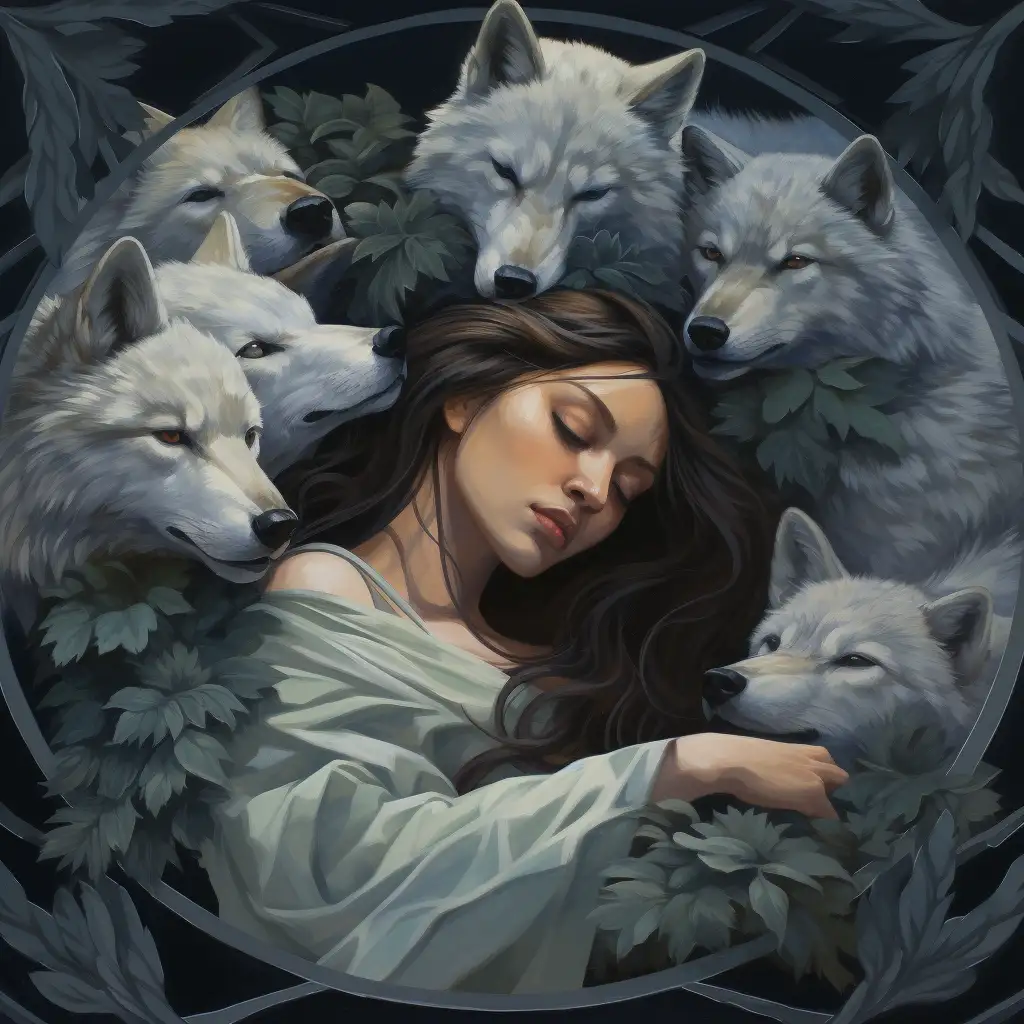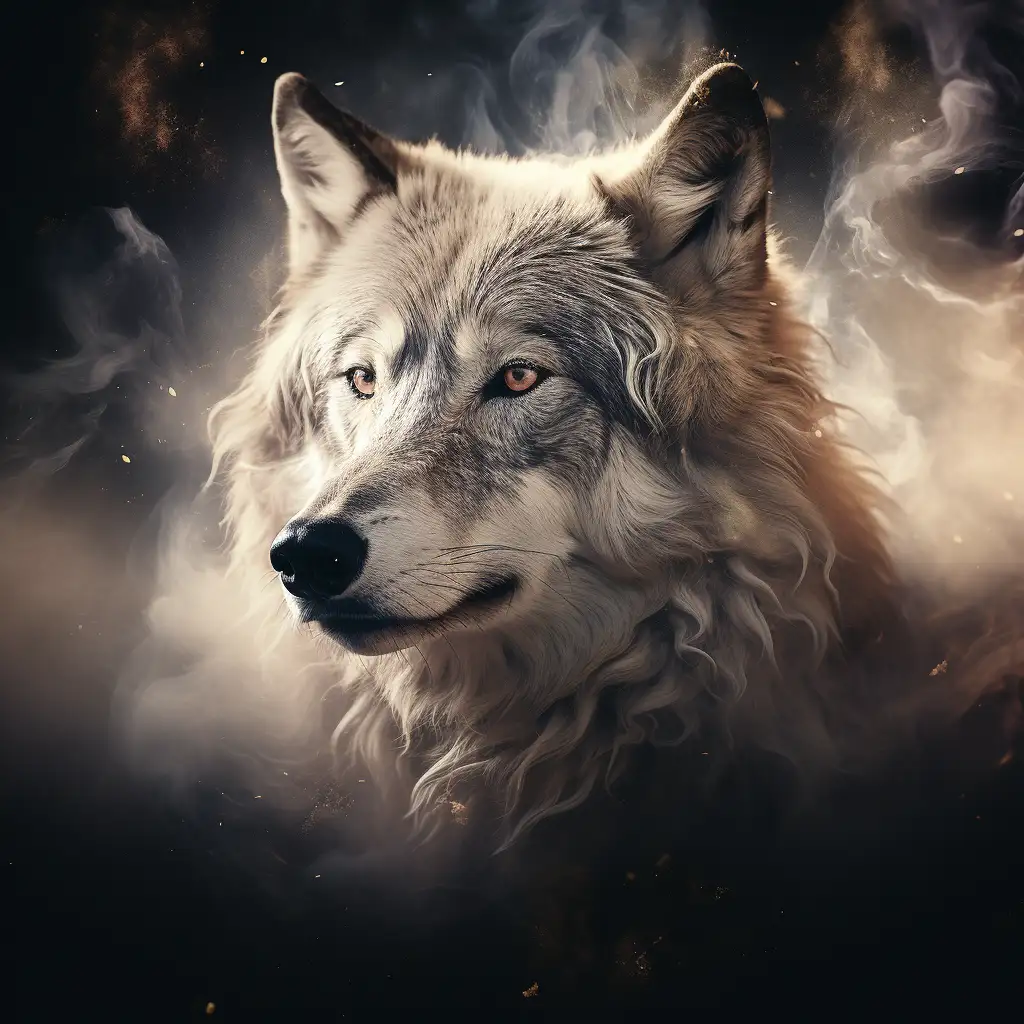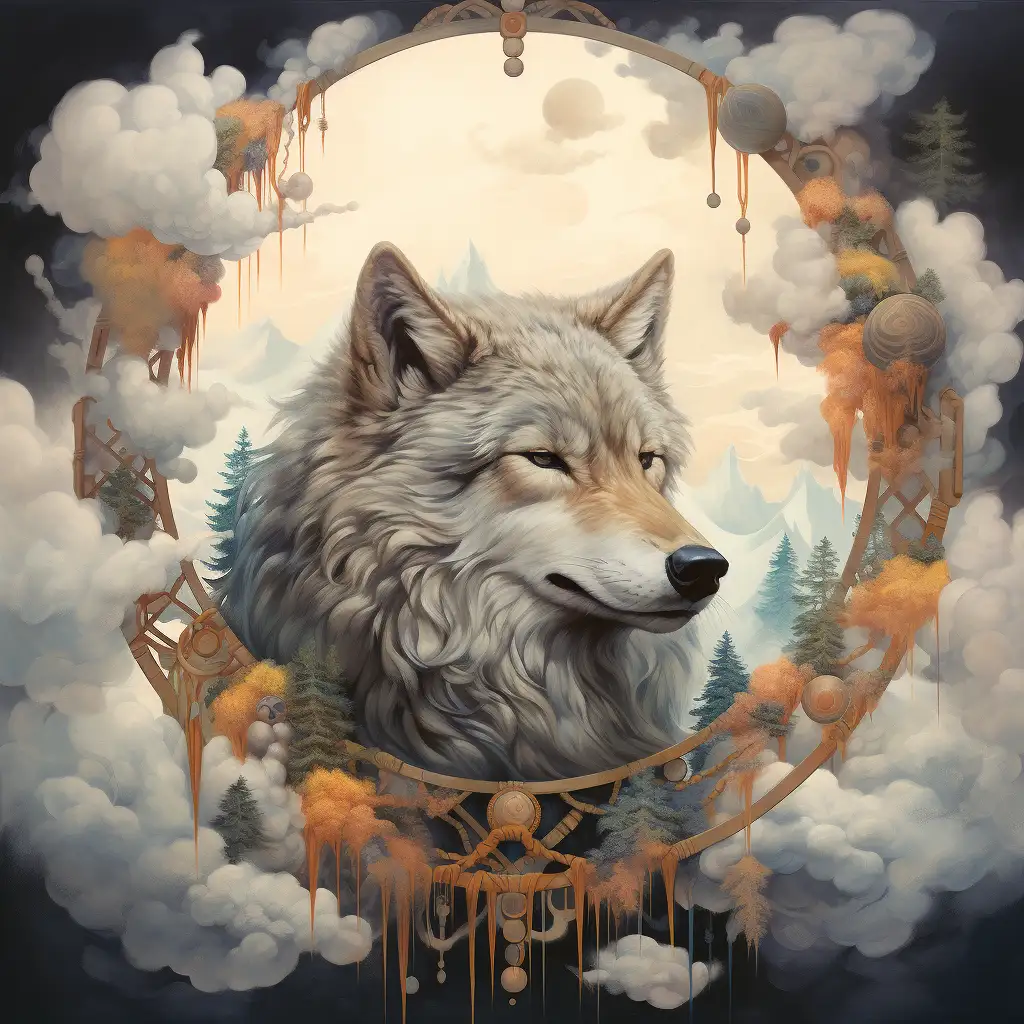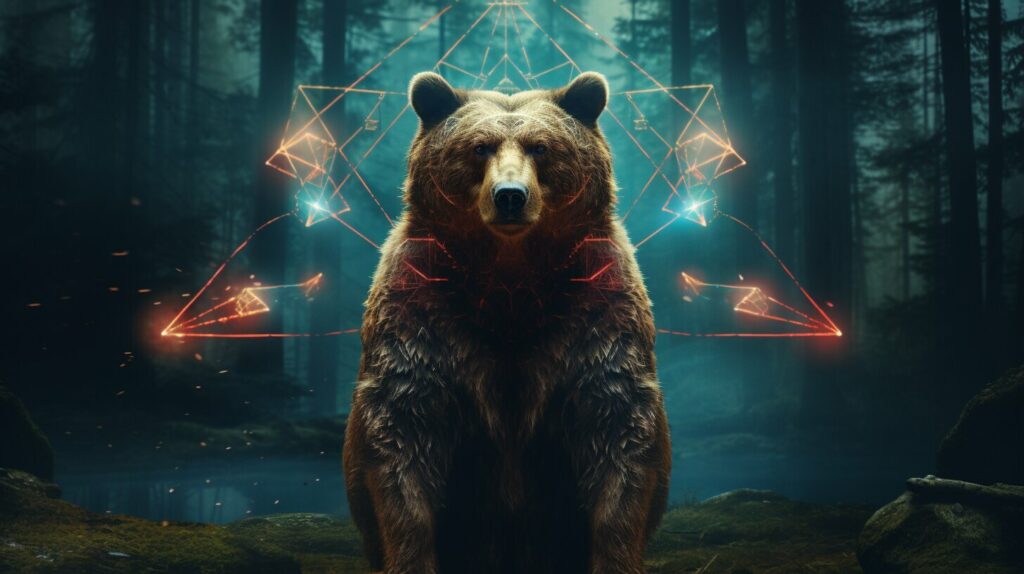Key Takeaways
2. Asian cultures revere the wolf as a sacred being, offering protection and spiritual guidance. Dreaming of a wolf in this context may signify a sense of divine protection or guidance.
3. Modern symbolism associates the wolf with independence, strength, and freedom. It represents the untamed aspects of our personality and can serve as a call to embrace our inner strength.
4. The interpretation of wolf dreams is influenced by factors such as the dream’s context, personal feelings about wolves, the behavior of the wolf in the dream, and unique life experiences.
5. Keeping a dream journal and reflecting on the context of the dream can provide insights into its meaning. Consider the setting, actions, and emotions experienced in the dream to uncover its symbolism.
6. Personal experiences with wolves, including encounters or symbolic meanings from family, religion, or culture, can shape the interpretation of wolf dreams.
7. Common themes in dreams about wolves include encountering friendly or hostile wolves. A friendly wolf might represent accepting instinctual aspects of oneself, while a hostile wolf could symbolize a perceived threat or an avoided challenge.
8. The significance of wolf dreams can vary based on gender and age. Men might associate the wolf with strength and dominance, while women may see it as a protective symbol. Children’s wolf dreams may reflect feelings of insecurity or fear.
9. Wolf dreams can be used for personal growth by embracing independence, acknowledging inner strength, confronting fears, and navigating leadership roles or power struggles.
Dreams can be a fascinating riddle, particularly when they feature compelling symbols like the wolf. Let’s uncover what dreaming about this enigmatic creature might signify.
The Wolf in Various Cultures
The wolf, an enigmatic and versatile creature, occupies a pivotal place in cultural stories and mythologies across the globe. Understanding these cultural contexts can provide enlightening insights when interpreting dreams about wolves.
North American Native Tribes: The Wolf as a Teacher and Pathfinder
For many North American Native tribes, the wolf holds a unique place of honor and respect. Revered as a symbol of wisdom, loyalty, and courage, the wolf serves as a powerful totem animal.
In tribes such as the Cherokee, the wolf is seen as a pathfinder and teacher, guiding tribe members with its wisdom and promoting harmony within the community. When a wolf makes an appearance in your dreams, it could be a manifestation of your subconscious mind reaching out for guidance or wisdom. It’s worth considering what lessons the wolf might be imparting, and how you can apply these insights to your waking life.
European Folklore: The Wolf as a Symbol of Fear and Danger
In contrast to the respect and reverence shown by North American Native tribes, European folklore often frames the wolf in a more ominous light. Here, the wolf is frequently depicted as a symbol of danger, fear, and deceit. Tales like “Little Red Riding Hood” and “The Boy Who Cried Wolf” have perpetuated the perception of the wolf as a menacing and treacherous creature.
If a wolf appears in your dream in a threatening or aggressive manner, mirroring its portrayal in European folklore, it might represent a looming fear or threat you’re facing in your waking life. Perhaps there’s a daunting challenge you’re avoiding, and your dream is a signal that it’s time to confront it head-on.
Asian Cultures: Wolves as Sacred Beings
Asian cultures, particularly those in Mongolia and Japan, view the wolf as a sacred being, offering protection and spiritual guidance. For the Ainu people of Japan, the wolf is revered as a divine creature that protects crops from other animals.
In the context of dreams, envisioning a wolf acting as a protector or guide could be your subconscious signaling that you’re not alone — that you have an unseen force watching over you. It’s a comforting thought, and one that can imbue you with a sense of security and peace in your waking hours.
Modern Interpretation: The Wolf as a Symbol of Strength and Freedom
In the realm of modern symbolism, the wolf often represents independence, strength, and freedom. The image of a lone wolf roaming the wilderness encapsulates a sense of untamed spirit and unyielding resolve. This symbol resonates with those who value independence and personal freedom.
If your dream features a wolf embodying these attributes, it might be a call from your subconscious to embrace these qualities more openly in your life. It could be a signal to assert your independence, stand strong in the face of adversity, or liberate yourself from constraints holding you back.

The Psychological Perspective of Wolf Dreams
When it comes to dream analysis, few figures loom as large as Carl Gustav Jung. One of the founding fathers of modern psychology, Jung introduced us to the concept of archetypes — primordial symbols that dwell in the collective unconscious and shape our dreams, myths, and stories.
Carl Jung’s Theory of Archetypes and The Shadow
Among the archetypes identified by Jung, the ‘Shadow’ holds particular relevance to our exploration of dreams about wolves. This archetype represents the unconscious aspects of our personality that we often repress or deny. These could be primal instincts, suppressed desires, hidden fears, or untamed emotions. The shadow may not always be a negative entity, but it is often perceived as such because it dwells in the parts of ourselves we’re hesitant to acknowledge or confront.
The Wolf as a Shadow Figure
In Jungian psychology, the wolf is often seen as a shadow figure. Dreaming of wolves, therefore, might symbolize the parts of ourselves we keep hidden, either out of fear, shame, or societal pressure. This might be your untamed, instinctual side, or perhaps a desire or emotion you’ve suppressed. The wolf in your dream could be a manifestation of these concealed aspects, serving as a call to acknowledge and integrate them into your conscious self.
If you find yourself often dreaming of wolves, it might be worth diving into some self-reflection. Are there parts of your personality or aspects of your desires you’ve been denying or hiding? Your dreams might be encouraging you to explore these hidden facets of your personality.
The Significance of Wolf Dreams in Personal Growth
Unveiling these shadow aspects through dreams is not something to be feared but seen as an opportunity for growth. Recognizing and integrating our shadow can lead to a more rounded understanding of ourselves and contribute to personal growth and self-acceptance.
So, the next time a wolf visits your dream, remember it could be more than just a random image. It might be your subconscious nudging you to explore the lesser-known territories of your inner world. By acknowledging and understanding these aspects, you embark on a path of self-discovery and transformation, leading to a fuller, more authentic version of yourself.
Interpreting Wolf Dreams: Key Factors
When trying to uncover the meaning of your wolf dream, it’s important to consider a few critical factors. The interpretation of such dreams is often influenced by the dream’s context, your personal feelings about wolves, the behavior of the wolf in the dream, and your unique life experiences.
Context of the Dream
The context of your dream plays a significant role in its interpretation. Details like the setting, the people present, the actions taken, and even the time of day can influence the dream’s meaning. For instance, a wolf appearing in a calm, peaceful forest may have a different interpretation than a wolf showing up in the midst of a bustling city. The first scenario might point towards a natural, instinctual aspect of your personality, while the latter might signify feelings of being out of place or incongruity in your current life situation.
Personal Feelings About Wolves
Your personal feelings and beliefs about wolves will also greatly shape the dream’s significance. If you fear wolves or associate them with danger due to personal beliefs or cultural conditioning, a wolf in your dream might symbolize something you fear or a challenge you’re facing in your waking life. Conversely, if you view wolves as majestic, strong creatures, dreaming of a wolf could represent a source of strength or inspiration.
Behavior of the Wolf
The behavior of the wolf in your dream can provide significant clues. A friendly, protective wolf might indicate that you have strong support systems in your life, or it might be calling you to be more protective over those you care about. A hostile or aggressive wolf, on the other hand, might represent a threat or a contentious issue that you need to confront.
Personal Experiences
Finally, your personal experiences play a crucial role in interpreting your wolf dreams. If you’ve had a personal encounter with a wolf, your dream could be a reflection of this experience. Additionally, if wolves have a special symbolic meaning in your family, religion, or culture, this symbolism could certainly carry over into your dreams.
Common Wolf Dreams and Their Interpretations
Each dream is unique, yet some common themes seem to recur in wolf dreams.
Dream of a friendly wolf
If you dream of a friendly wolf, it might be encouraging you to accept the more instinctual parts of your nature.
Dream of a hostile/aggressive wolf
Conversely, a hostile wolf might symbolize something or someone in your life that you perceive as a threat.
Dream of a wolf pack
Dreaming of a wolf pack? This could signify your need for community and belonging or highlight your leadership potential.
Dream of a lone wolf
A lone wolf in your dreams might call attention to your feelings of isolation or your need for independence.
Dream of being chased by a wolf
Being chased by a wolf in a dream? This could signify that you’re avoiding dealing with a frightening or intimidating situation.
Dream of transforming into a wolf
If you dream of becoming a wolf, it might be a call to harness your inner strength and assert your independence.

The Wolf in Dreams: Gender and Age Perspectives
The significance of a wolf dream can vary greatly depending on the dreamer’s age and gender. The subconscious mind uses dream symbols in unique ways to communicate messages that resonate with our personal experiences, feelings, and circumstances.
Wolf Dreams in Children
Children are often more susceptible to feeling insecure or scared due to their inherent vulnerability. In this context, dreams of wolves could reflect these feelings of insecurity or fear. A dream of a wolf could represent an intimidating figure in their lives or a situation that they find frightening.
For instance, a child who is feeling bullied or overwhelmed might dream of a wolf as a representation of these intimidating forces. In such cases, it’s important to provide reassurance and help them navigate through their fears and insecurities.
Wolf Dreams in Adults
As adults, our experiences become more complex, and our dreams evolve alongside them. We often grapple with issues related to power dynamics, leadership challenges, and societal expectations. In this context, a wolf dream might symbolize different aspects of these experiences.
For example, dreaming of leading a pack of wolves could signify that you’re navigating a leadership role or taking charge of a situation in your waking life. Conversely, a wolf dream might reflect feelings of being dominated or controlled if you’re dealing with power struggles in your personal or professional life.
Wolf Dreams in Men
From a gender perspective, men might often associate the wolf with assertions of strength, dominance, or leadership. In the masculine context, a wolf can symbolize the untamed, assertive aspects of one’s personality.
If you’re a man dreaming of a wolf, it might be a reflection of your relationship with power, aggression, or leadership. It could also signify your innate instincts or a call to acknowledge and embrace your inner strength.
Wolf Dreams in Women
For women, the wolf in a dream can often take on a protective role. Many women find strength in their capacity to nurture and protect, and a wolf — known for its fierce protectiveness of its pack — can symbolize this aspect.
If you’re a woman who dreams of a wolf, it might reflect your protective instincts or a situation in which you need to stand your ground. Alternatively, it might be a sign of an assertive, independent aspect of your personality that you need to acknowledge.
How to Use Wolf Dreams for Personal Growth
Dreams, in all their mysterious allure, can often serve as a profound source of insight and self-discovery. Particularly, dreams about wolves, rich with symbolism, can act as catalysts for personal growth. Here’s how you can navigate these messages for your personal development.
Embracing Independence
Wolves, with their symbolic representation of independence, might be nudging you to embrace your own independence. If you often dream of a lone wolf or find yourself as a wolf navigating the wilderness in your dreams, consider what these images mean in relation to your waking life.
Are you currently in a situation where you’re overly dependent on someone or something? Or perhaps you’re avoiding taking responsibility for a particular aspect of your life? These dreams might be your subconscious mind’s way of encouraging you to assert your independence and take control of your own life.
Trusting Your Instincts
Wolves are known for their keen instincts, which they rely on for survival. If your dreams feature wolves prominently, it could be a call for you to trust your own instincts more. Perhaps you’re in a situation where logic and reason seem to fail, and it’s time to listen to your gut feelings.
Are you at a crossroads in your life, unsure of which path to choose? Trusting your instincts doesn’t mean abandoning reason, but it does involve acknowledging and honoring your intuitive feelings. Your dreams might be encouraging you to give your intuition a stronger voice in your decision-making process.
Acknowledging Hidden Aspects of Yourself
As we discussed earlier, from a Jungian perspective, a wolf can represent the ‘Shadow’ aspects of your personality — those parts of yourself that you’ve repressed or ignored. A wolf appearing in your dreams could be an invitation to explore these hidden facets of your self.
Engaging with your ‘Shadow’ can be a transformative process, leading to increased self-awareness and acceptance. So, if a wolf shows up in your dreams, it might be an opportunity to reflect on your hidden desires, untamed emotions, or unexpressed aspects of your personality.
Implementing the Messages into Your Waking Life
The key to using wolf dreams for personal growth lies in taking these insights and applying them to your waking life. It’s about recognizing these symbolic messages and implementing the lessons learned in your daily life.
It might involve making conscious efforts to be more independent, trusting your instincts more, or exploring and accepting the different aspects of your personality. Remember, these dreams are not meant to instill fear but to illuminate the path to personal growth and self-understanding.
Case Studies: Real-life Wolf Dream Stories and Interpretations
We can gain deeper insights into the potential meanings of wolf dreams by exploring real-life examples. These case studies illustrate how personal experiences, feelings, and circumstances shape our dream narratives and the messages they hold.
Jane’s Dream: The Guiding Wolf
Jane dreamt that she was lost in a thick, intimidating forest. She felt scared and disoriented until a friendly wolf appeared. The wolf didn’t speak, but it guided her through the forest with an air of assurance. Jane felt a sense of calm and security in the wolf’s presence, and she followed it without fear.
Upon waking, Jane contemplated her dream. She was in a phase of her life where she felt lost and unsure about her future. Seeing the wolf guide her through the forest, she understood the dream as a call to trust her intuition and courageously navigate her life’s path. She felt reassured that she had the inner guidance and courage necessary to make her way through the uncertainties she was facing.
John’s Dream: The Pursuing Wolves
John had a recurring dream of being chased by a pack of wolves. He felt a mixture of fear and exhaustion as he continually tried to outrun the wolves. But no matter how hard he tried, the wolves were always hot on his heels.
In his waking life, John was dealing with a stressful work situation. He had been avoiding a conflict with a co-worker and was feeling increasingly pressured. The dream of being pursued by wolves prompted him to confront the issue he had been evading. He realized that, much like the wolves in his dream, the problems at work wouldn’t simply go away unless he faced them.
Inspired by his dream, John decided to take action, addressing the conflict with his co-worker, which greatly reduced his stress levels and improved his work environment.
Gaining Insights from Dreams
These narratives are prime examples of how our dreams reflect our subconscious thoughts and feelings. Jane’s and John’s dreams about wolves served as catalysts for change in their lives. By contemplating their dreams and interpreting their symbolism, they were able to understand their emotions and navigate their challenges more effectively.
Remember, these interpretations are unique to Jane and John and may not apply to everyone. However, they illustrate the process of analyzing and gaining insights from our dreams. Your dream interpretation might differ based on your personal feelings, experiences, and current life situations. The key lies in introspecting, understanding your unique circumstances, and using the insights from your dreams to guide your personal growth and life journey.
Conclusion
Dreaming about wolves is a deeply personal and unique experience that can offer profound insights into your inner world. Don’t shy away from these nocturnal adventures. Instead, embrace them as opportunities for introspection, growth, and understanding. By shedding light on the enigmatic world of dreams, you’re one step closer to understanding the most complex puzzle of all — yourself.
FAQs
A: Wolf dreams can carry different messages depending on the context and personal associations. They might suggest the need for independence, leadership, or embracing a more assertive side of your personality. Alternatively, they can symbolize a need to explore your shadow self or confront hidden fears.
Q: Can dreaming of wolves relate to relationships or social interactions?
A: Yes, dreaming of wolves can reflect dynamics within relationships or social interactions. They may indicate dominance struggles, power imbalances, or a need to assert oneself in a group setting. It’s important to consider the specific details and emotions of the dream to understand its precise meaning.
Q: How can I interpret my own dream about wolves?
A: Personal interpretation depends on your unique experiences, emotions, and associations with wolves. Consider the context of the dream, your feelings towards the wolves, and any other symbols or events that stood out. Reflect on how the dream relates to your waking life and any challenges or changes you may be facing.
Q: Are recurrent wolf dreams significant?
A: Recurrent dreams about wolves may indicate that a particular theme or message is trying to gain your attention. They could represent unresolved issues, persistent emotions, or aspects of yourself that need acknowledgment. Paying attention to the recurring nature of the dreams can provide deeper insights into their meaning.
Q: Can lucid dreaming be helpful in understanding wolf dreams?
A: Yes, practicing lucid dreaming techniques can allow you to become aware within the dream and potentially influence its course. By attaining lucidity during a wolf dream, you can interact with the wolves, ask them questions, or gain a deeper understanding of their message.
Q: Should I be concerned if I frequently dream about wolves?
A: Frequent dreams about wolves don’t necessarily indicate a cause for concern. However, if the dreams cause significant distress, fear, or interfere with your daily life, it may be beneficial to explore their meaning further with the help of a dream analyst, therapist, or counselor.







